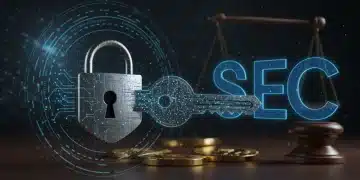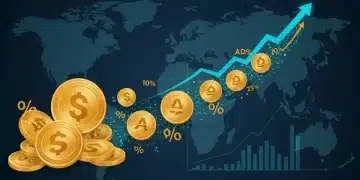Decentralized token evaluation: a new frontier in finance

Decentralized token evaluation offers increased transparency, reduces manipulation risks, and enhances community insights, but it faces challenges like market volatility and regulatory uncertainty.
When it comes to value assessment, decentralized token evaluation is changing the game. But how does this innovative method impact your investments? Let’s dive in.
Understanding decentralized token evaluation
When exploring decentralized token evaluation, it’s important to grasp its core principles. This innovative approach assesses the value of digital tokens without relying on central authorities. By doing this, it empowers investors with more control over their assets.
Key Concepts of Decentralized Token Evaluation
The concept revolves around transparency and trust. By utilizing blockchain technology, each token’s history and transactions are publicly available, making it easier for users to verify their worth. This opens up a new way of thinking about asset evaluation.
Benefits of Decentralized Evaluation
Evaluating tokens in a decentralized manner offers several advantages:
- Enhanced Transparency: All information about tokens is recorded on the blockchain, allowing users to assess their value accurately.
- Reduced Manipulation: Without a central authority, it’s harder for individuals or organizations to artificially inflate or deflate token values.
- Increased Accessibility: Anyone with internet access can participate in the evaluation process, democratizing investment opportunities.
- Community-Driven Insights: Users contribute to evaluations based on real experiences, providing valuable insights into token performance.
The technology behind decentralized token evaluation continuously evolves. It incorporates advanced algorithms and machine learning techniques to improve accuracy and efficiency. By leveraging these innovations, the evaluation process becomes more robust and reliable.
Moreover, this approach fosters investor confidence. When individuals understand how their investments are assessed and valued, they are more likely to engage with the market. This is essential for building a strong and sustainable ecosystem around digital tokens.
The Role of Community Feedback
Community involvement is crucial in this evaluation process. By sharing knowledge and experiences, users contribute to a richer understanding of token value. Feedback loops encourage continuous improvement, making the ecosystem more resilient over time.
As the landscape of decentralized finance (DeFi) grows, understanding decentralized token evaluation becomes even more essential. By staying informed about these concepts, you can navigate the complexities of the digital asset world more effectively.
Key benefits of decentralized token evaluation
Understanding the key benefits of decentralized token evaluation can significantly enhance your investment strategy. This innovative approach transforms how investors assess digital assets.
Increased Transparency
One of the primary advantages is enhanced transparency. Since the token’s value and history are recorded on the blockchain, users can verify details easily. This clear visibility builds trust and allows for informed decision-making.
Reduced Risk of Manipulation
Decentralization minimizes the risk of manipulation. In traditional finance, centralized entities can influence market prices. However, with decentralized token evaluation, prices reflect real-time market sentiments without external interference.
- Market-driven valuations: Prices are determined by supply and demand.
- Greater market stability: Fewer individuals control the market, leading to fewer dramatic shifts.
- Community-focused tracking: Investors can rely on genuine insights for token performance.
Another benefit is increased accessibility to evaluations. Anyone with internet access can participate in token evaluations, creating a broader marketplace. This democratization encourages diverse investor participation, capturing different perspectives.
Furthermore, community-driven evaluations can yield valuable insights. When users share their experiences, they contribute to a collective understanding of token strengths and weaknesses. This not only helps individual investors but also enhances the overall market.
Empowerment of Investors
Investors are empowered through decentralized evaluations, as they can assess and understand their assets better. This empowerment leads to more confident investing and allows individuals to adapt to market changes swiftly.
Additionally, decentralized token evaluation is adaptable. As the blockchain technology evolves, so do evaluation methods. This continual improvement ensures investors have access to the latest tools and techniques for assessing their investments.
Cost Efficiency
Cost efficiency is another key benefit. Traditional evaluation methods often involve fees and commissions from intermediaries. In contrast, decentralized evaluations can reduce or eliminate these costs, making investments more affordable and appealing.
Challenges in evaluating decentralized tokens

Evaluating decentralized tokens comes with its own set of challenges. Understanding these obstacles is crucial for making informed investment decisions.
Volatility of the Market
The first challenge is the inherent volatility in cryptocurrency markets. Prices can fluctuate dramatically within short periods, making it difficult to assess a token’s true value. This volatility can deter potential investors and complicate evaluations.
Data Reliability
Another significant issue is data reliability. Information about decentralized tokens comes from various sources, and not all are trustworthy. Inaccurate data can lead to poor evaluation outcomes, impacting investment strategies.
- Misleading metrics: Some tokens may present exaggerated performance metrics.
- Limited historical data: Newer tokens often lack enough historical data for thorough analysis.
- Influence of social media: Market sentiment can shift rapidly based on social media trends, creating confusion.
Regulatory uncertainty poses a further challenge. The legal environment surrounding decentralized tokens is still evolving. Different countries implement various regulations, creating complexities in compliance and evaluation.
Additionally, technological barriers can hinder effective evaluations. Not all investors are familiar with blockchain technology, making it hard to understand how evaluations work. This knowledge gap can lead to under-informed decisions.
Liquidity Issues
Liquidity is another critical concern. Many decentralized tokens may not have enough market activity for proper valuation. Low liquidity can cause significant price variations when attempting to buy or sell assets.
As the decentralized finance sector grows, overcoming these challenges becomes a priority. Investors must stay informed about the market dynamics and continuously adapt their evaluation methods.
Real-world applications of decentralized token evaluation
Decentralized token evaluation has practical applications across various industries. Understanding these uses can highlight its potential to transform finance and investment.
Investment Platforms
One major application is in investment platforms. Users can leverage decentralized token evaluation to make informed decisions about buying or selling assets. These platforms provide real-time data, allowing investors to assess token value accurately.
Digital Collectibles
Another area is digital collectibles. In the rise of non-fungible tokens (NFTs), decentralized evaluations help determine the worth of unique items. This process ensures that each collectible’s value reflects market demand and rarity.
- Transparent pricing: Buyers and sellers can track actual market prices.
- Market insights: Evaluations provide information about trends and demand.
- Fair assessments: The community can contribute to valuation, keeping it unbiased.
Moreover, decentralized token evaluation plays a significant role in decentralized finance (DeFi). Users can assess the value of different tokens and determine their potential returns on investment. This helps in making strategies for lending, borrowing, and yield farming.
An additional real-world application is in supply chain management. Companies can use decentralized evaluations to track tokenized assets throughout their logistics. This transparency ensures that products are genuine and helps in maintaining value integrity.
Crowdfunding and Fundraising
Crowdfunding platforms also benefit from decentralized evaluations. Project creators can tokenize their ideas and gauge interest by assessing how tokens are valued by potential investors. This method allows for more effective fundraising through community engagement.
As these applications continue to evolve, the importance of decentralized token evaluation will only grow. It opens doors for innovation, creating new opportunities in the digital economy.
Future trends in decentralized token evaluation
The future of decentralized token evaluation is promising, with several emerging trends shaping its development. Understanding these trends can help investors prepare for the changes ahead.
Increased Adoption of AI
One significant trend is the increased adoption of artificial intelligence (AI) in evaluation processes. AI can analyze vast amounts of data quickly and efficiently, providing investors with real-time insights. Using machine learning algorithms, AI can detect patterns and predict market movements, enhancing decision-making.
Interoperability Among Blockchains
Another trend is the push for interoperability among different blockchains. As various blockchain networks come together, it will become easier to evaluate tokens across platforms. This connectivity allows for more comprehensive assessments and broader access to data.
- Cross-chain evaluations: Understanding token value on multiple networks provides a clearer picture.
- Improved user experience: Investors can seamlessly access and evaluate tokens from different blockchains.
- Collaborative ecosystems: Enhanced collaboration may lead to innovative evaluation methods.
Moreover, there is a growing focus on community-driven models. As more platforms encourage community participation, user feedback will play a crucial role in evaluations. This collaborative approach can lead to increased trust and accountability in the evaluation process.
Regulatory Developments
Regulations are also expected to evolve. Governments are beginning to recognize the importance of regulating decentralized finance, which will impact how tokens are evaluated. Clearer regulations may bring more stability to the market, helping to reduce fraud and misrepresentation.
As the landscape changes, new tools and platforms will likely emerge to support decentralized token evaluations. These innovations could include more sophisticated analytics and valuation methods, tailored for specific asset classes.
In summary, the future trends in decentralized token evaluation point toward a more integrated, efficient, and community-focused ecosystem. By staying informed, investors can better navigate the evolving market.
In conclusion, decentralized token evaluation is reshaping the way we assess digital assets. As we explored, this innovative approach offers numerous benefits, including greater transparency, reduced manipulation risk, and community-driven insights. However, challenges such as market volatility and data reliability remain important considerations. The future looks bright, with trends like AI integration and growing regulatory frameworks paving the way for a more robust evaluation ecosystem. Staying informed about these changes will help investors navigate the evolving landscape and make smarter investment decisions.
FAQ – Frequently Asked Questions about Decentralized Token Evaluation
What are the main benefits of decentralized token evaluation?
The main benefits include increased transparency, reduced manipulation risk, and improved community-driven insights.
What challenges do investors face when evaluating decentralized tokens?
Investors face challenges such as market volatility, data reliability issues, and regulatory uncertainty.
How does AI influence decentralized token evaluation?
AI enhances decentralized token evaluation by providing real-time insights and analyzing large datasets for better predictions.
What future trends should I watch in decentralized token evaluation?
Key trends include increased AI adoption, interoperability among blockchains, and more community involvement in evaluation processes.





